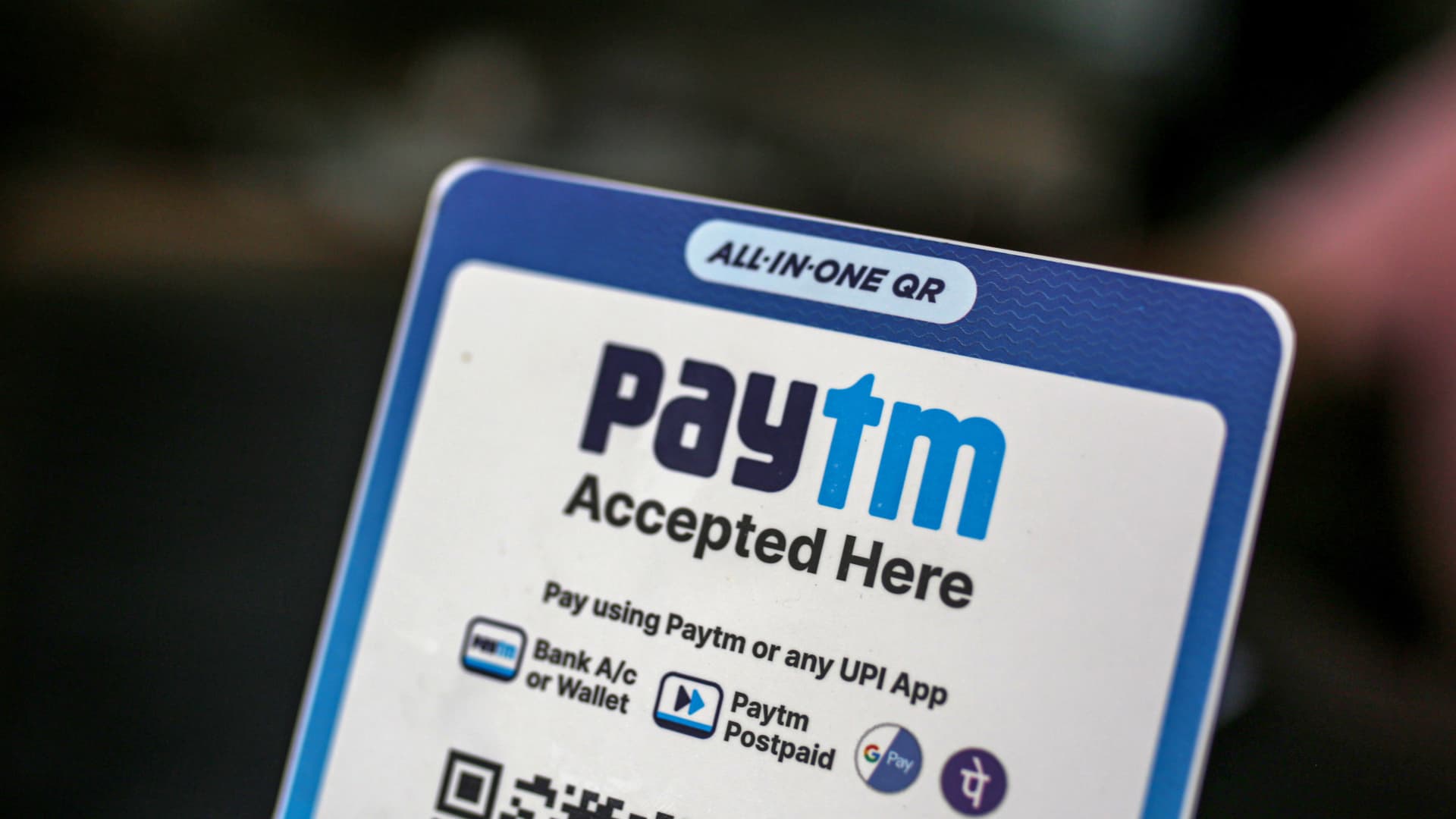
This is CNBC's live blog covering Asia-Pacific markets.
Japan's Nikkei 225 ended just short of breaching the 40,000 level, leading gains in Asia stocks on Friday, while China markets rose as investors digested manufacturing data from the mainland.
Japan's Nikkei 225 hit a fresh record high, closing 1.9% higher at 39,910.82. The broader Topix index added 1.3% to end at 2,709.42 — it rose 1.8% for the week.
Official data showed China's February manufacturing PMI at 49.1, in line with a Reuters Poll forecast. The private Caixin manufacturing final PMI came in at 50.9, slightly higher than the previous month's 50.8.
A PMI reading above 50 indicates expansion, while below that denotes a contraction.
China's CSI 300 closed 0.6% higher at 3,537.8, extending gains after closing almost 2% higher in the last session. The index was up 1.4% for the week.
Get Tri-state area news and weather forecasts to your inbox. Sign up for NBC New York newsletters.
Hong Kong's Hang Seng index was 0.4% higher, still set for a weekly decline of 0.9%.
Money Report
In Australia, the S&P/ASX 200 ended 0.6% higher at 7,745.60. The index rose 1.3% for the week.
South Korea markets were shut for the Movement Day holiday.
Overnight, the Nasdaq Composite clocked its first closing record since November 2021 on Thursday as tech and chip stocks rallied.
The tech-heavy index ended with gains of 0.90% to close at an all-time high at 16,091.92. The S&P 500 also closed at a record, rising 0.52% to hit 5,096.27. The Dow Jones Industrial Average ticked higher by 0.12%.
Data overnight showed, U.S. inflation rose in line with expectations in January, according to a key gauge the Federal Reserve uses to assess inflation.
The personal consumption expenditures price index excluding food and energy costs rose 0.4% in January and 2.8% from a year earlier, in line with the Dow Jones consensus estimates.
— CNBC's Hakyung Kim and Samantha Subin contributed to this report.
South Korean exports growth surges on strong chip demand
South Korean exports in February rose 4.8% from a year earlier to $52.41 billion, beating Reuters' estimates of a 1.9% increase, on strong demand for its semiconductors, preliminary government data showed.
The export print compares to a 18% growth in January. Overall, imports fell by 13.1%, steeper than estimates of a 10.4% drop.
"The ICT cycle (Information and Communications Technology cycle) is on an upturn," said Trinh Nguyen, senior economist at Natixis. "With the manufacturing cycle returning to to growth in the U.S., that should support South Korea," she added.
—Lee Ying Shan
Japan's February factory activity contracts at fastest pace in over three years
Japan's February factory activity shrank at the fastest pace in more than three years on the back of weakening demand.
The au Jibun Bank's flash Japan manufacturing purchasing managers' index fell to to 47.2 in February, compared with January's 48.0 reading, indicating continued contraction in private sector business activity.
The reading signals a ninth consecutive deterioration in business activity and the strongest contraction recorded since August 2020, according to au Jibun Bank.
Japan's benchmark index has continued to extend its rally after surging to an all-time high last week. The Nikkei 225 was trading 1.83% higher at 39,883.86 in Friday morning trading.
—Lee Ying Shan
Paytm attempts to sever ties with embattled payments bank business

Paytm will discontinue inter-company agreements with its troubled payments bank unit, the financial technology firm said in a statement on Friday.
Shares of Paytm, listed as One97 Communications, on India's National Stock Exchange jumped almost 5% in early India trading hours.
"As part of this process to reduce dependencies, Paytm and PPBL (Paytm Payments Bank Limited) have mutually agreed to discontinue various inter-company agreements with Paytm and its group entities," the statement read.
Paytm did not specify what agreements were being terminated.
This comes just days after Paytm CEO Vijay Shekhar Sharma stepped down as non-executive chairman and board member of the payments bank unit in a major shakeup following the Reserve Bank of India clampdown.
— Shreyashi Sanyal
China manufacturing contracts for fifth straight month, official data shows

China's manufacturing activity contracted for a fifth straight month in February, official figures on Friday showed, which were at odds with a private survey that signaled factory activity expanded.
Data from China's National Bureau of Statistics showed manufacturing PMI fell to 49.1 in February from 49.2 in January. The reading was in line with a Reuters poll estimate.
The Caixin/S&P Global manufacturing PMI, however, edged up to 50.9 in February from 50.8 in the previous month.
A PMI reading above 50 indicates expansion, while below that denotes a contraction.
"Companies noted further upturns in both production and new work, with rates of growth quickening slightly from January, helped in part by a rise in new export orders," the private Caixin survey read.
— Shreyashi Sanyal
India's third-quarter economic growth soars past expectations

India's economy grew much faster than expected in the October to December quarter, and at its fastest pace in six quarters.
Data showed GDP grew 8.4% in the third fiscal quarter, blowing past Reuters Poll expectations of 6.6% growth, on the back of higher private consumption and strong manufacturing and construction activity.
The October-December quarter reading was also higher than the 7.6% growth clocked in the prior three months.
The Indian government raised its GDP growth outlook for fiscal year 2023-24 to 7.6% from 7.3% forecast earlier.
The data also boosted Prime Minister Narendra Modi's economic record ahead of a highly anticipated national election.
"For PM Modi and BJP who will be going to the polls in April-May, it will yet provide another boost. For RBI (Reserve Bank of India), the strong growth momentum will only reinforce their bias to stay on hold at 6.5% for the foreseeable future," Commerzbank analysts wrote in a note.
— Shreyashi Sanyal
Bank of Japan chief reportedly says 2% inflation target yet not in sight

Bank of Japan Governor Kazuo Ueda said that he was not confident about Japan's economy achieving the central bank's 2% inflation target, according to multiple news reports.
"I don't think we are there yet," Ueda told a news conference after attending the G20 finance leaders' meeting in Sao Paulo, Reuters reported.
Japanese news agency Kyodo News reported Ueda described the outcome of the forthcoming spring wage negotiations as "a focal point."
The spring wage negotiations are expected to be held later this month between trade unions and company management to set monthly wage rates ahead of the start of Japan's fiscal year in April.
— Reuters, Kyodo News
Japan's jobless rate remains unchanged in January
Japan's unemployment rate remained the same in January compared with the previous month, according to government data.
The jobless rate was at 2.4% in January, the same as in December. It matched Reuters poll estimates.
A separate reading showed the jobs-to-applicants ratio was unchanged at 1.27 in January.
— Shreyashi Sanyal
CNBC Pro: Investors should move money out of cash and into fixed income, Franklin Templeton strategist says
Investors should move out of cash and into fixed income with some duration, said Franklin Templeton's chief market strategist, Stephen Dover.
"Inflation probably won't get quite as low as market expectations and interest rates won't drop quite as far as market expectations," Dover said, adding that "this is is an opportunity, particularly in the fixed income markets, to pick up a little bit of yield."
CNBC Pro subscribers can read more here.
— Lee Ying Shan
CNBC Pro: Citi names 'Super 7' global stocks similar to the Magnificent 7 — but cheaper
Citi has identified European stocks it says are similar to the high-flying "Magnificent Seven" U.S. technology stocks, but trade at cheaper valuations leaving more room for them to rise.
Despite a recent rally, Citi says its "Super Seven" group of stocks have lagged the Magnificent Seven, leaving more upside potential. These stocks, similar to the U.S. Big Tech companies command high-profit margins, solid earnings-per-share growth, and competitive advantages or "economic moats".
CNBC Pro subscribers can read more here.
— Ganesh Rao
Nasdaq closes at all-time high Thursday
U.S. stocks finished Thursday's trading session in the green, with the Nasdaq Composite recording a record-high closing level.
The tech-heavy Nasdaq Composite added 0.9% to end at an all-time closing high of 16,091.92.
The Dow Jones Industrial Average rose around 47 points, or 0.1%, at 38,996.39. The S&P 500 added 0.5% and also finished at a record close at 5,096.27.
— Hakyung Kim
Miners are sitting the bitcoin rally out but still tracking for monster February gains
Bitcoin miners slid in the final two trading days of February, pushing them into the red for the week, but were still set to post huge gains for the month.
Marathon Digital dropped 15% on Thursday, while Riot Platforms fell 10%. CleanSpark and Cipher Mining were lower by 9% and 8%, respectively, and Iris Energy retreated 3%. Nearly all mining stocks are down for the week, with the exception of CleanSpark, which is trading just above the flat line.
Those moves came as bitcoin appeared to take a pause from this week's rally. Still, the cryptocurrency is about to notch a 45% gain for February and is on pace for a 21% weekly gain.
Similarly, miners have soared this month. Marathon is on pace for a 47% February gain, Iris Energy is up 48% and Riot has advanced nearly 30%. CleanSpark is on track for a 106% monthly gain.
— Tanaya Macheel
Oil posts monthly gain as OPEC+ expected to extend cuts, inflation rises as expected
Crude oil futures are headed for a second consecutive monthly gain as OPEC+ is expected to extend its production cuts and the latest inflation data was in line with expectations.
The West Texas Intermediate contract for April lost 28 cents, or 0.36%, to settle $78.26 a barrel. The April Brent contract, which expires Thursday, fell 6 cents or 0.07% to settle at $83.62 a barrel.
U.S. and Brent gained 3% and 2.3% respectively for the month.
— Spencer Kimball






